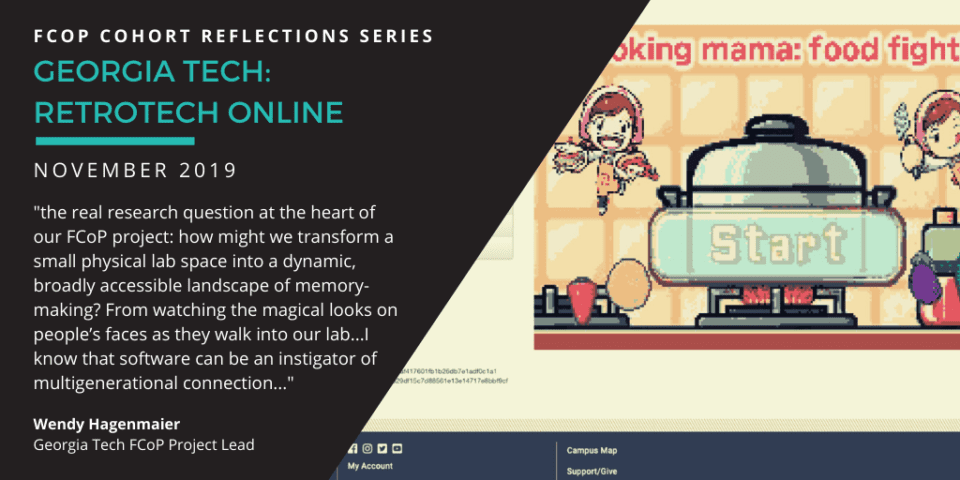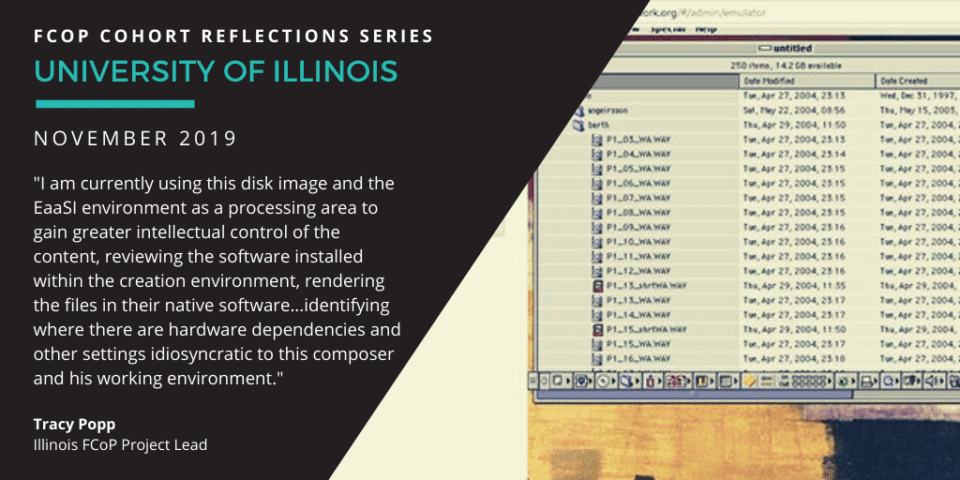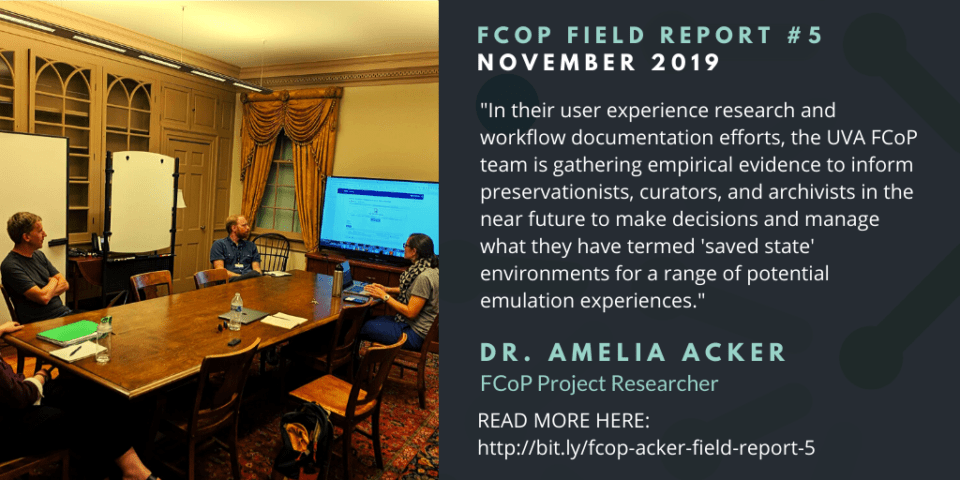FCoP Reflections Blog Post Series:
Continuing our FCoP Reflections Blog Post Series, we are happy to share posts from Georgia Tech and University of Illinois:

Wendy Hagenmaier of Georgia Tech writes about skunkworks in the library, building bridges between data and metadata siloes, and illuminating the people at the heart of Georgia Tech’s technological pasts.

Tracy Popp of University of Illinois Urbana-Champaign writes about proprietary digital recording and annotation software, a digital content format registry, and scaling workflows to provide a centralized service.
Cohort on the road again
Several cohort members will be travelling in the next few months to share their experiences on the FCoP project, specifically at two highly visible conferences. The first will be in February at the International Digital Curation Conference (IDCC) in Dublin, Ireland, where the FCoP cohort will be involved in two parts of the IDCC program. Fernando Rios, a member of the University of Arizona team, will be presenting a paper entitled “Sustaining Software Preservation Efforts Through Use and Communities of Practice,” which was authored by Rios and his UA colleagues Monique Lassere, Judd Ruggill, and Ken McAllister.
In addition, Tracy Popp (University of Illinois) and Lauren Work (University of Virginia) will be collaborating with Seth Anderson and Ethan Gates (both members of the Yale-based EaaSI team) on a workshop entitled “Preparation and Process: Software Preservation and Emulation for Research Data.”
The workshop represents an exciting attempt to bring the challenges and issues of software preservation to a research-data curation context. The domain of research data is not new for the Software Preservation Network, but the University of Arizona paper and the EaaSI/FCoP workshops will be the cohort’s first opportunity to engage in a concrete way with the research data community.
Meanwhile, representatives from the FCoP cohort received news that their proposal to Code4Lib 2020 was accepted. The panel presentation, entitled “Cohort4Lib” will delve into how software preservation and maintenance might be sustained, informed by the cohort’s experience. The topic, though less technical or workflow focused, is nevertheless a top priority for the project, as it relates to a key project goal: establishing a baseline for capacity needed to pursue software preservation. Given the conference, the panel’s starting point will be software developed by libraries: what lessons can we take from maintaining our own code? And how can we apply those lessons to the broader challenges of software preservation? Sitting in on the panel with Georgia Tech will be Wendy Hagenmaier, Maura Gerke, and Amanda Pellerin (Georgia Tech); Tracy Popp (University of Illinois); Lauren Work and Elizabeth Wilkinson (University of Virginia); and potentially others from the FCoP cohort.
Field Report #5 by Dr. Amelia Acker
Last week Dr. Amelia Acker, our Project Field Researcher, published Field Report #5 covering her site visit with the University of Virginia.
 There she surveys the dynamic work that the Cohort site has done over the course of the project to emulate the original working environment for their Peter Sheeran papers, a special collection comprised of numerous software dependent items, including CAD (Computer Aided Design) files and Building Information Modeling Software. Her field report highlights the broad set of team collaborations at UVA that are being coordinated to experiment and document their pioneering work with emulation and the EaaS sandbox. Most importantly, she shines a light on the strategies UVA is developing to educate users and advocate for ongoing support within the institution to make software preservation a programmatic activity. Dr. Acker’s visit to UVA was the final in a series of research site visits that has been taking place over the past year, all of which you can find in the “Research” section of the FCoP site.
There she surveys the dynamic work that the Cohort site has done over the course of the project to emulate the original working environment for their Peter Sheeran papers, a special collection comprised of numerous software dependent items, including CAD (Computer Aided Design) files and Building Information Modeling Software. Her field report highlights the broad set of team collaborations at UVA that are being coordinated to experiment and document their pioneering work with emulation and the EaaS sandbox. Most importantly, she shines a light on the strategies UVA is developing to educate users and advocate for ongoing support within the institution to make software preservation a programmatic activity. Dr. Acker’s visit to UVA was the final in a series of research site visits that has been taking place over the past year, all of which you can find in the “Research” section of the FCoP site.
Dr. Acker recently attended the most recent 2019 ACM Conference on Computer Supported Cooperative Work and Social Computing, where she co-organized and led a Mapping the “How” of Collaborative Action workshop. This research methods workshop brought together researchers who study the development and enactment of processes amongst teams using data-driven technologies. During the workshop, Amelia facilitated a “Mapping Data Flows” session, where participants were exposed to interview and mapping techniques, such as participatory workflow analysis, that she used in her interviews with team members at field sites this summer.
“It was great to share the participatory workflow method and my fieldwork experiences from the FCoP cohort with a group of information researchers who study teams designing, implementing, and maintaining digital tools,” she said. “I’m excited to see how outcomes of this research will contribute to our understanding of implementing emulation workflows because the practices of software preservation has the potential to influence accounts of social computing in new and exciting ways.”
Amelia is now hard at work on a number of additional related project deliverables that include packaging her research findings and making them publicly available to future researchers, producing an interim research report, exploring the development of a teaching module for educating future professionals on best practices for software emulation, and drafting articles and proceedings for upcoming conferences in Spring 2020 (e.g., ASIS&T, JASIST, CSCW). We’ll have more great updates on her work in future Stacktrace newsletters.